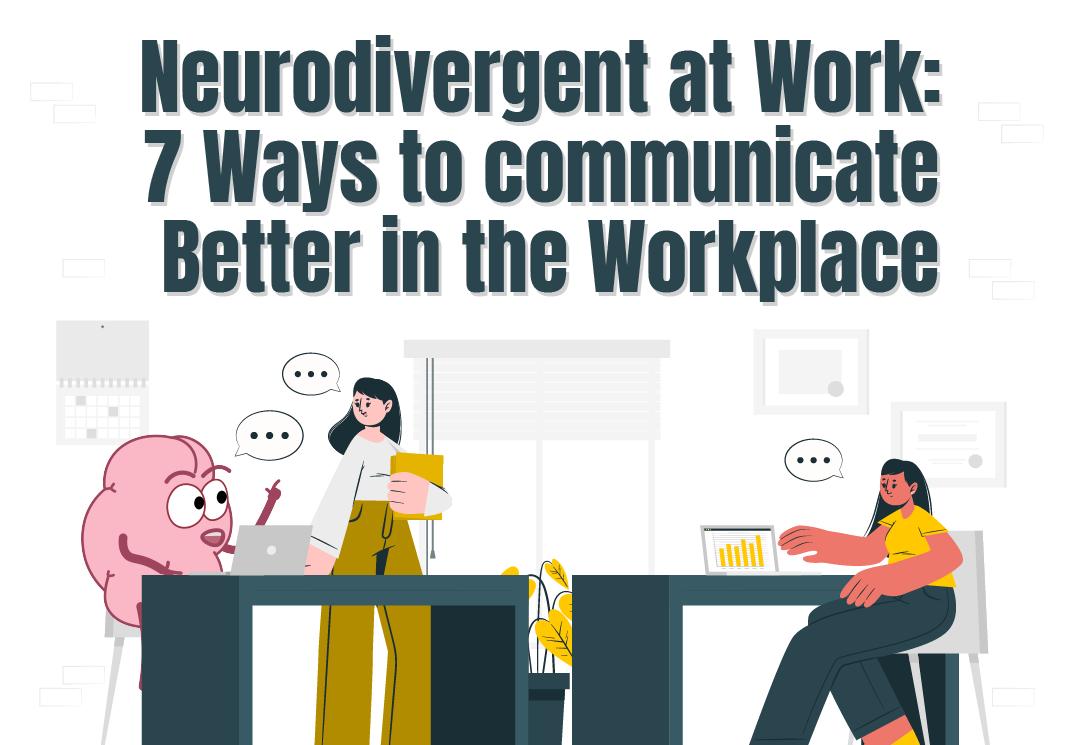Cart
Subtotal:
Your purchase supports our efforts in building the largest affordable and accessible neurodivergent library in the world 🌍 Thank you ❤

Talking with others at work can be tricky, especially for Neurodivergent individuals ( people with different ways of thinking, like those with ADHD or autism). But with a few simple tips, it’s easier to share ideas, ask for help, and work together.
In this blog, we’ll show you ways to communicate better at work, so everyone feels understood and can do their best.
Neurodivergent individuals may face several communication challenges at work, including:
Sensory Sensitivities:
Loud noises or bright lights can make it hard to focus on conversations or meetings, which can make communicating more difficult.
Processing Speed:
Some people may need more time to think and understand information, which can make it harder to respond quickly in conversations.
Diverse Communication Styles:
People with different ways of thinking might express themselves in unique ways, which can sometimes be misunderstood at work.
Need for Clarity:
Some people need clear instructions and might get confused or frustrated if things aren’t explained clearly.
1. Be Clear and Direct
• Use simple and clear words, and avoid tricky or unclear phrases. If you need something, ask for it directly.
For example, instead of saying, “Can you help me when you get a chance?” say, “Can you help me finish this task now?”
2. Practice Active Listening
• Pay close attention when someone is talking and listen carefully. If you need a little time to think about what they said, it’s okay to ask for a moment before you reply.
This helps make sure you understand what they mean.
3. Take notes and write down your ideas
• If talking feels too much, try writing follow up messages (like an email or note) to explain or remind people of what was said.
This gives you time to think and helps avoid confusion.
4. Ask for Regular Check-Ins
• Set up short meetings with your manager or team to talk about how you’re doing and ask questions.
This helps everyone stay on track and make sure you’re all working together well.
5.Set Boundaries and Let Them Know Your Needs
• Be honest about what helps you work best.
For example:
If loud noises and bright lights distract you, ask for a desk in a quiet area or use noise-canceling headphones and lamps with adjustable brightness.
If you need extra time to think, let your friends or teammates know so they can help you.
You can even share with them some resources to let them know about Neurodiversity.
6.Use planners and trackers
• Use tools like calendars, to-do lists, or trackers to help organise your tasks and communicate them to your team.
This makes it easier for you and your colleagues to keep track of what needs to be done and when.
7.Participate in trainings to Help the Team Understand Communication
• Organising training can help the team learn how to communicate better with everyone, understand different ways of thinking, and make sure no one is judged.
This helps everyone work together in a way that appreciates each person’s unique strengths, creating a supportive and inclusive team.
Supporting different ways of communicating at work is really important to make sure everyone feels included. When we use clear words, make quiet spaces, and be patient, we help everyone feel understood and respected. These small changes make the workplace better for everyone, not just for neurodivergent people. It helps teams work better, be more productive, and show kindness to each other. By accepting different ways of communicating, we make a place where everyone can do their best and feel valued.
What does neurodivergent mean?
Neurodivergent means someone's brain works a bit differently from most people. This can include people with ADHD, autism, and other unique ways of thinking and learning.
Why is it valuable to include neurodivergent people in a work environment?
Including neurodivergent people at work is valuable because they bring different ways of thinking that can help solve problems and come up with creative ideas. Their unique perspectives make the team stronger and help create a more welcoming and productive workplace for everyone.
How important is effective communication with neurodivergent colleagues at work?
Effective communication with neurodivergent colleagues creates inclusivity and trust and it boosts their confidence to perform and engage in a healthy productive work environment.
What should I do if I notice a colleague is struggling to understand a point during a discussion?
If a colleague seems to be struggling, pause the conversation to check for understanding. Ask if they have questions, and consider paraphrasing the main points or providing written notes afterward to reinforce the information.
Why is neurodiversity training important in the workplace?
Neurodiversity training helps everyone at work understand the different ways people communicate and the challenges neurodivergent people may face. This helps everyone be more kind, less judgmental, and learn how to work better together.

© NeuroDive. All Rights Reserved
Subscribe to our newsletter to receive news on update.
For support, please contact us at support@neurodive.co